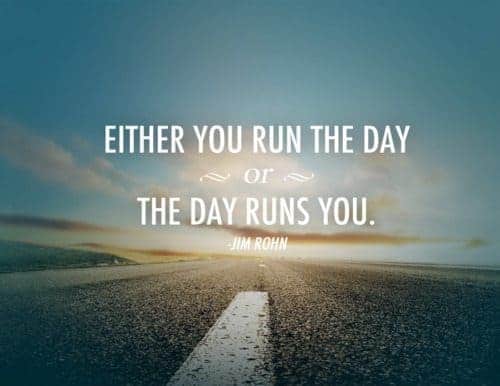3 Reasons Hydration is More Important Than I Ever Thought
When I was in high school I was a competitive swimmer, and our coach always seemed to be going on and on about our water intake.
I remember her saying things like, “Just because you can’t see that you are sweating doesn’t mean you aren’t getting dehydrated.”
We used to get in trouble if we left our water bottles at home, so I was always good at bringing mine to practice.
Remembering to actually drink out of it was a whole other problem.
The entire time I was in high school I complained of fatigue, muscle aches, headaches, confusion, and general malaise.
The doctor ran all kinds of tests which all came back fine.
He finally told my grandmother I was suffering from ‘Teenage Fatigue.’
That basically meant he didn’t know what was wrong with me, and I had ailments consistent with being a teenage girl.
When I got older and started working for the YMCA, I became aware of the symptoms of dehydration.
They are:
- Fatigue
- Dizziness
- Confusion
- Headaches
- Muscle cramps
“Drinking water is essential to a healthy lifestyle.” – Stephen Curry
I drank so little water in high school and all of the symptoms I experienced matched those of dehydration.
I mean, clearly, I didn’t die, but I’m pretty sure I spent four years dehydrated.
I did a tiny bit better as an adult, but still drank nowhere near the recommended amount of water.
Then a few months ago, I started a pre-op diet for weight loss surgery.
I had to cut out my caffeine addiction; along with sugary and bubbly drinks.
This left me with nothing really to drink except for water.
The doctor was crystal clear that I needed at least 100 ounces of water a day.
That seemed excessive, but I followed the program to the letter.
I cut out all the drink stuff about two weeks earlier than I had to, so I wasn’t going through a caffeine and a food withdrawal at the same time.
I began to drink a ton of water, often getting more than 100 ounces.
Once the caffeine withdrawal ended I began to feel amazing.
About three days into my actual pre-op diet, I felt better than I had in ages!
I had lost a few pounds, but it felt like more than that.
Everything just felt… better.
I told my husband that for the first time in my life, I was drinking the recommended amount of water for an adult human being.
“I always have water, tons of water. It’s even in my bathroom because I used to be so bad at drinking water, and I want to stay hydrated.” – Selena Gomez
I thought, surely, water can not have this much of an impact on my body.
It felt like everything was suddenly functioning at levels I hadn’t felt in a long time.
A little bit of research later, and I realized that hydration plays a bigger role than I ever realized.
It helps your muscles and joints work better.
It improves your cardiovascular health and keeps your heart healthy.
Lastly, it removes all of the ick we put in our bodies, and keeps everything ‘clean.’
Your muscles and joints work better when you drink enough water
I had been suffering from strange chronic joint pain.
After a series of tests, the doctor decided I likely had Fibromyalgia.
After starting my pre-op diet for weight loss surgery, which included making sure I drank about 100 ounces of water a day, I noticed my joints hurt a lot less.
I wondered if it had anything to do with my increasing my intake of water, and sure enough, the science agreed!
Earle Logan, who has a Bachelor of Science in Health Studies, says that: “Joint pain usually occurs when the cartilage has been weakened or damaged, which then leads to typical symptoms such as inflammation, pain and stiffness.
Since approximately 60% of joint cartilage is made from water, it is critical that we keep hydrated during periods of joint damage, otherwise, our production of synovial fluid will be reduced and we increase our risk of friction pain and cartilage deterioration.”
Water can help ease many symptoms of joint disorders.
With Rheumatoid Arthritis, the extra synovial fluid makes a big difference, but an increase in water can help with the diarrhea and dizziness associated with the disease.
If a patient has Osteoarthritis, the additional water can help with weight loss, which reduces the friction and wear and tear on the joints.
Gout is stimulated by an excess of uric acid, which is produced in your kidneys.
Getting plenty of water will help flush that out.
Earle Logan refers to “An online survey conducted by the Boston Medical School found that an increased consumption of water reduced gout attacks by 48%.”
Water promotes a healthy cardiovascular system
How exactly does water help your cardiovascular system?
The answer is fairly simple when you realize that your heart is a muscle.
Water energizes your muscles and helps them work in an optimal function.
This means that when you are hydrated your heart can pump blood more efficiently.
An article from Viveve explains that, “When you’re sufficiently hydrated, your heart is able to function properly and keep your blood moving, providing oxygen and nutrients to the rest of your body.”
Conversely, when you are dehydrated your heart is working slower allowing for blood clots that cause strokes.
Not drinking enough water can also contribute to hypertension and the eventual build-up of plaque in your arteries.
Clogged arteries and hypertension are the leading causes of heart attacks.
Now, drinking water won’t solve all the problems that contribute to these diseases, but being dehydrated will definitely exacerbate any potential issues.
Water acts as a cleansing agent for your body
“Drinking water is like washing out your insides. The water will cleanse the system, fill you up, decrease your caloric load and improve the function of all your tissues.”
– Kevin R. Stone
Water is like your body’s secret cleaning agent.
It flushes out things like uric acid and helps keep your blood pumping.
But water doesn’t stop there! It also helps burn fat, according to Melina Jampolis, an internist and board-certified physician nutrition specialist.
Dehydration decreases lipolysis, which is the process your body uses to convert fat into energy.
When you increase your daily amount of water you kickstart lipolysis and your metabolism.
Your body then needs to get rid of any waste found in the stored fat cells.
Enter water again!
Water increases your urine, which is a function of the kidneys, in order to remove waste.
Water also helps keep your stool soft, and your bowel movements regular.
Obviously, urinating and defecating are the two primary ways your body eliminates waste. There is also sweating, and that requires water too!
Are you getting enough water
“I watch people around me not drinking any water all day, and I turn into the water police.
I’m constantly asking, ‘Are you drinking water?’
Being dehydrated very quickly affects my energy.” –Jessica Parker Kennedy
The U.S. National Academies of Sciences, Engineering, and Medicine determined that an adequate daily fluid intake is:
- About 15.5 cups (3.7 liters) of fluids a day for men (125.112 ounces)
- About 11.5 cups (2.7 liters) of fluids a day for women (91.2979 ounces)
Tips for remembering to drink enough water
“I try to start drinking water as soon as my feet hit the floor in the morning.” – Mary Kay Andrews
If you need help remembering to drink water you can try getting one of those giant gallon size bottles that has the times of the day on the side.
One gallon holds 128 ounces so if you go this route and drink the whole thing, you will be in great shape.
I had to set a reminder on my app that I downloaded to help track food and liquid intake.
It goes off every hour to remind me to drink water.
I know that seems silly, I thought so too, at first.
However, the benefits I have felt from increasing my water intake to the correct amount makes it all worthwhile!
I can feel my joints and muscles hurting less.
I am much less fatigued and can stay focused.
I have officially turned into a nagging wife, and keep trying to explain to my husband how he needs to drink more water.
One of these days, maybe he will listen.
But until then I hope you stay hydrated, my friend, however you choose to do it!











